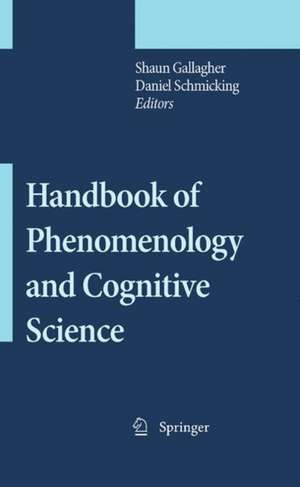Handbook of Phenomenology and Cognitive Science
Editat de Daniel Schmicking, Shaun Gallagheren Limba Engleză Hardback – 18 dec 2009
| Toate formatele și edițiile | Preț | Express |
|---|---|---|
| Paperback (1) | 1601.50 lei 38-44 zile | |
| SPRINGER NETHERLANDS – 13 dec 2014 | 1601.50 lei 38-44 zile | |
| Hardback (1) | 1581.48 lei 38-44 zile | |
| SPRINGER NETHERLANDS – 18 dec 2009 | 1581.48 lei 38-44 zile |
Preț: 1581.48 lei
Preț vechi: 2080.89 lei
-24% Nou
Puncte Express: 2372
Preț estimativ în valută:
302.60€ • 315.98$ • 249.89£
302.60€ • 315.98$ • 249.89£
Carte tipărită la comandă
Livrare economică 11-17 aprilie
Preluare comenzi: 021 569.72.76
Specificații
ISBN-13: 9789048126453
ISBN-10: 9048126452
Pagini: 700
Ilustrații: IX, 688 p.
Dimensiuni: 193 x 260 x 41 mm
Greutate: 1.11 kg
Ediția:2010
Editura: SPRINGER NETHERLANDS
Colecția Springer
Locul publicării:Dordrecht, Netherlands
ISBN-10: 9048126452
Pagini: 700
Ilustrații: IX, 688 p.
Dimensiuni: 193 x 260 x 41 mm
Greutate: 1.11 kg
Ediția:2010
Editura: SPRINGER NETHERLANDS
Colecția Springer
Locul publicării:Dordrecht, Netherlands
Public țintă
ResearchCuprins
Naturalized Phenomenology.- Phenomenology and Non-reductionist Cognitive Science.- A Toolbox of Phenomenological Methods.- Towards a Formalism for Expressing Structures of Consciousness.- Consciousness.- Attention in Context.- The Phenomenology and Neurobiology of Moods and Emotions.- Phenomenology, Imagination and Interdisciplinary Research.- The Function of Weak Phantasy in Perception and Thinking.- Myself with No Body? Body, Bodily-Consciousness and Self-consciousness.- A Husserlian, Neurophenomenologic Approach to Embodiment.- Body and Movement: Basic Dynamic Principles.- Empirical and Phenomenological Studies of Embodied Cognition.- The Problem of Other Minds.- Mutual Gaze and Intersubjectivity.- Knowing Other People’s Mental States as if They Were One’s Own.- Intersubjectivity, Cognition, and Language.- The Problem of Representation.- Action and Agency.- Meaning, World and the Second Person.- Husserl and Language.- Metaphor and Cognition.- Phenomenology and Cognitive Linguistics.- The Role of Phenomenology in Psychophysics.- A Neurophenomenological Study of Epileptic Seizure Anticipation.- How Unconscious is Subliminal Perception?.- IW - “The Man Who Lost His Body”.- Phenomenology and Psychopathology.- Delusional Atmosphere and Delusional Belief.- Autoscopy: Disrupted Self in Neuropsychiatric Disorders and Anomalous Conscious States.- Phenomenology as Description and as Explanation: The Case of Schizophrenia.- Agency with Impairments of Movement.
Recenzii
From the reviews:
“It is a much needed volume for examination of possible connections between phenomenology and cognitive science, the current vanguard of the dominant mainstream school of cognitive psychology. … There are different topics covered and there are different perspectives presented. … chapters have their respective merits and deserve consideration. Springer has provided to readers a broad coverage of the possible relationship between phenomenology and cognitive science.” (Thomas F. Cloonan, Journal of Phenomenological Psychology, Vol. 43 (2), 2012)
“It is a much needed volume for examination of possible connections between phenomenology and cognitive science, the current vanguard of the dominant mainstream school of cognitive psychology. … There are different topics covered and there are different perspectives presented. … chapters have their respective merits and deserve consideration. Springer has provided to readers a broad coverage of the possible relationship between phenomenology and cognitive science.” (Thomas F. Cloonan, Journal of Phenomenological Psychology, Vol. 43 (2), 2012)
Textul de pe ultima copertă
The Handbook of Phenomenology and Cognitive Science contains a comprehensive and authoritative overview of the main ideas and methods currently used at the intersection of phenomenology and the neuro- and cognitive sciences. The idea that phenomenology, in the European continental tradition, has something to offer to the cognitive sciences is a relatively recent development in our attempt to understand the mind. Here in one volume the leading researchers in this area address the central topics that define the intersection between phenomenological studies and the cognitive sciences. They address questions about methodology, the analysis of perception, memory, imagination, attention, emotion, intersubjectivity, the role of the body and language, and they explore a variety of pathologies that throw light on our everyday experiences. The authors draw on the classical works of phenomenologists such as Husserl, Heidegger, Merleau-Ponty, Gurwitsch, and Sartre, but they also push the traditional lines of phenomenology to new boundaries, mapping out new terrain in connection with the empirical science of the mind and body. These essays are revelatory for both phenomenologists who want to understand what cognitive science can contribute to an understanding of experience, and for scientists who want to understand how they can use phenomenology in their empirical studies.
Caracteristici
Offers an interdisciplinary perspective on the mind An international set of authors contribute the most recent thought on an important set of problems for science and philosophy Includes not only detailed analyses of the central topics in the philosophy and science of the mind, but also important explorations of psycho- and neuro-pathologies Provides clearly written chapters on methodological issues that address the question of naturalizing phenomenology, and the approaches of neurophenomenology and “front-loaded” phenomenology
















